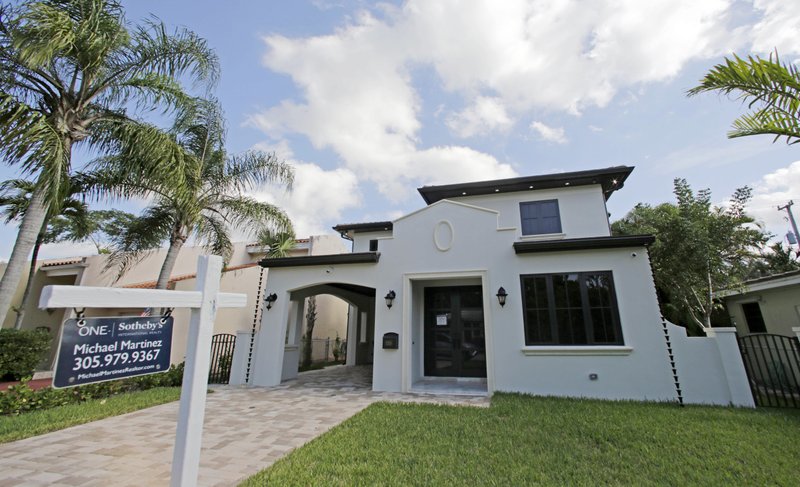WASHINGTON -- Mortgage rates increased this week for the sixth week in a row to highs not seen in more than two years.
Mortgage giant Freddie Mac, the Federal Home Loan Mortgage Corp., said Thursday that the average rate on a 30-year fixed rate loan jumped this week to 4.13 percent from 4.08 percent the previous week. The benchmark rate surpassed its 3.95 percent level of a year ago.
The rate on 15-year home loans, a popular choice for people who are refinancing, rose to 3.36 percent from 3.34 percent.
Long-term mortgage and interest rates have surged in the five weeks since Donald Trump's victory in November to become the country's next president.
Since the election, bond investors have been demanding higher long-term yields and paying lower prices for bonds as they look toward rising inflation under the Trump administration. Anticipated tax cuts and increased government spending to upgrade roads, bridges and airports could stoke inflation. That would depress prices of long-term Treasury bonds because inflation would erode their value over time. Bond yields move opposite to prices and also influence long-term mortgage rates.
The yield on the 10-year Treasury bond stood at 2.34 percent Wednesday, down from 2.38 percent a week earlier. But by Thursday morning, it had risen to 2.40 percent. That's up from 1.87 percent on Election Day Nov. 8.
Next week, at a Federal Reserve meeting, policymakers are expected to raise the central bank's benchmark interest rate for the first time in nearly a year.
"The 10-year Treasury yield dipped this week following the release of the Job Openings and Labor Turnover Survey," Sean Becketti, Freddie Mac chief economist, said in a statement. "As rates continue to climb and the year comes to a close, next week's [Federal Reserve] meeting will be the talk of the town with the markets 94 percent certain of a quarter-point-rate hike."
The fear of rising mortgage interest rates may have nudged people into action on home-buying in November.
Mortgage applications are down 0.7 percent from a week ago, the Mortgage Bankers Association reported Wednesday. But over the last month, mortgage applications for buying new and previously owned homes jumped 12 percent.
"People who were thinking about buying maybe said, 'I'll buy now,'" said Michael Fratantoni, economist for the association. Yet, he said, the recent surge may have also happened partly because mortgage credit has become more available and also because the job market has improved and the election relieved some uncertainty about the future.
Meanwhile, refinancing activity plunged 28 percent last month. The downturn is typical, Fratantoni said.
"Refinancing is almost entirely driven by rates," so when rates climb, people decide not to refinance existing mortgages.
The average mortgage loan reached $247,563 in the third quarter, an all-time high since the Mortgage Bankers Association began tracking that figure, the organization reported Wednesday.
The Mortgage Bankers Association is predicting the rate on a 30-year fixed rate mortgage will rise to 4.4 percent by late 2017, still a historically low rate.
Despite the rise in people seeking mortgages for home purchases lately, Fratantoni said getting a loan is still difficult for many potential homebuyers. Mortgage credit increased in November, making it possible for more people to buy, but it remains tight, he said.
The association tracks mortgage availability through an index. When mortgages were easily available prior to the housing market crash, the index rose above 800. It became very difficult to get a mortgage after the housing crisis and recession in 2008, and the index fell to 100 in 2012. Now, it's at 160 -- an improvement but still tight, Fratantoni said.
Some relief has come as Fannie Mae, the Federal National Mortgage Association, and Freddie Mac recently have agreed to purchase from lenders loans with less stringent requirements. The loans, under the new programs, can allow homebuyers to make down payments of just 3 to 5 percent -- making it easier for young first-time homebuyers to come up with the money needed to make a purchase, Fratantoni said. Without backing from Fannie Mae and Freddie Mac, homebuyers may have to save substantially more to provide down payments equaling 20 percent of the home purchase price.
There has also been slightly more leniency on credit scores, but requirements continue to remain tough. The average credit score for homebuyers getting mortgages backed by Freddie Mac recently has been 750, Fratantoni said. That's a relatively high score. People who can get loans through the Federal Housing Administration have scores averaging about 700. FHA loans are intended to make homes affordable for moderate-income people.
The process of getting a loan "continues to be challenging for the first-time buyer," Fratantoni said, but credit availability has increased for three consecutive months.
To calculate average mortgage rates, Freddie Mac surveys lenders across the country between Monday and Wednesday each week.
The average doesn't include extra fees, known as points, which most borrowers must pay to get the lowest rates. One point equals 1 percent of the loan amount.
The average fee for a 30-year mortgage was unchanged this week at 0.5 point. The fee on 15-year loans also remained at 0.5 point.
Rates on adjustable five-year loans rose to 3.17 percent from 3.15 percent. The fee ticked up to 0.5 point from 0.4 point.
Information for this article was contributed by Kathy Orton of The Washington Post, Christopher S. Rugaber of The Associated Press and by Gail Marks Jarvis of the Chicago Tribune.
Business on 12/09/2016
